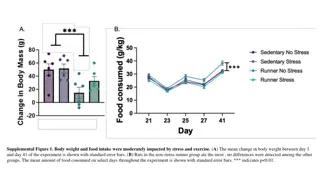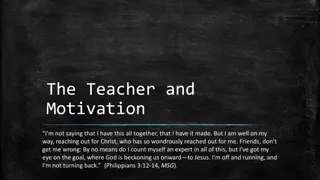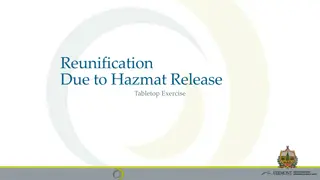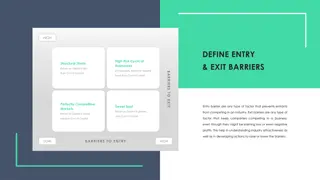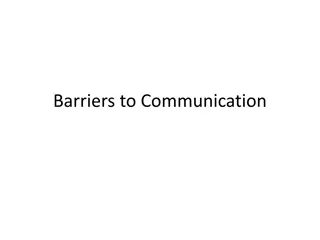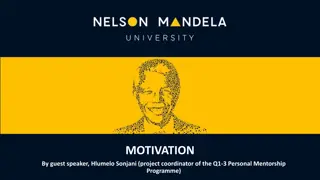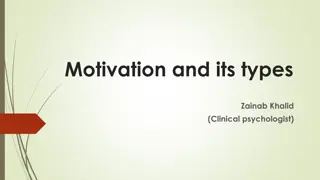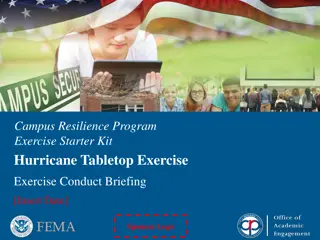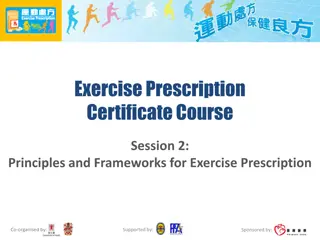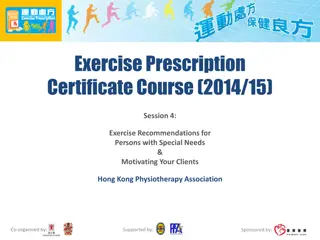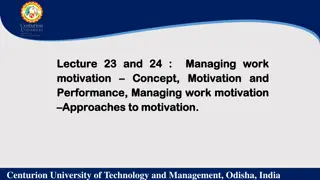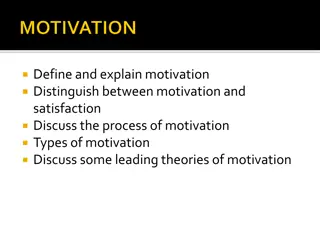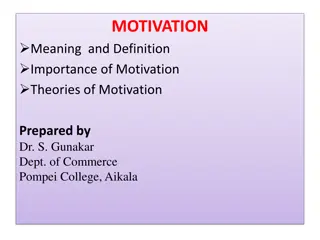Exploring Exercise: Benefits, Motivation, and Barriers
Regular exercise not only improves physical health but also enhances mental well-being. It plays a crucial role in maintaining overall health, reducing the risk of various diseases, and boosting self-esteem. Understanding the motivations behind exercise can lead to sustained engagement and positive outcomes. However, common barriers such as costs, safety concerns, lack of time, and motivation can hinder individuals from reaping the benefits of physical activity.
Download Presentation

Please find below an Image/Link to download the presentation.
The content on the website is provided AS IS for your information and personal use only. It may not be sold, licensed, or shared on other websites without obtaining consent from the author. Download presentation by click this link. If you encounter any issues during the download, it is possible that the publisher has removed the file from their server.
E N D
Presentation Transcript
Exercise Motivation
Exercise in a recovery context Everyone knows that exercise is good for our bodies and physical health. In addition to weight control, exercise improves and maintains overall health by supporting the immune system. Weight-bearing exercises keeps bones strong and aerobic exercises strengthens the heart and lungs. But did you know that exercise is also good for our mental health? One of the best things about exercising for mental health is that anyone can do it, so long as they respect their individual circumstances.
Benefits of exercise Regular participation in exercise has shown to have significant benefits on our health. Benefits include: Enhanced mental health and well-being Improved physical health Reduced symptoms of anxiety and depression Improved self-esteem and confidence Reduced risk of developing serious physical health conditions (including cardiovascular disease, diabetes and cancer) Healthy weight loss Provides a positive focus and sense of purpose a key element in combating depression Encourages social inclusion Reduced feelings of anger and frustration Enhanced concentration and sleeping patterns
Think yourself fit Before we begin to train the body, we have to train the mind. You want to get fit. But do you know why? List as many reasons as you can. Whatever it is that drives you, motivation matters as your willingness to engage with exercise will only ever be as strong as that motivation.
Exercise motivation Consider the following questions: What do you think the results of exercising your mind and body will be? How much do you value those results? How do you feel about doing it (confident, embarrassed, frightened, determined)? What do others think about it, and do they influence you? How easy do you think it will be to regularly train the body and mind for a short time? How much control do you have over your ability to make that happen?
Barriers to exercise What are the some of the common barriers to doing exercise?
Barriers to exercise Cost Safety considerations Lack of time Non-enjoyment Lack of motivation Overly self-conscious/embarrassed to exercise Poor body image Lack of energy Fear of injury No exercise partner Little support to exercise Look at the above reasons. Which if any apply to you? Are there other factors which are making it difficult to exercise? What can you do to overcome these?
Exercise motivation I should do some exercise. Reframe the way you conceive doing exercise.
Exercise benefits statements Exercise improves my self-esteem. Exercising makes me feel relaxed. Exercise helps me decrease fatigue Now come up with some exercise benefit statements of your own!
ATHLETE PROFILE BARRIERS / FRUSTRATIONS MOTIVATION MOTIVATION
ATHLETE PROFILE GOALS / OPPORTUNITIES BEHAVIOUR MOTIVATION UNMOTIVATED MOTIVATED INACTIVE ACTIVE BEGINNER ADVANCED SOLO GROUPS HARD WORK FUN SPONTANEOUS PLANNED
Identity based habits (James Clear) Identity is a powerful motivator. Your current behaviours are simply a reflection of your current identity. To change your behaviour, you need to start believing new things about yourself and incorporate it into your sense of self. Changing your beliefs involves two steps. 1. Decide the type of person you want to be. 2. Prove it to yourself with small wins. For example, if you want to be a runner, start calling yourself a runner.
Activity: Look to Future Imagine you have become more active, how would you feel? What would you be doing differently than you aren t doing now? What would you be doing less off? What would you say to yourself? What would others notice about you that is different?
Top Tips Stay active, at a level that is right for you listen to your body, start slowly and build gradually. Train the mind. Tell yourself you are the type of person that is active. Look for small wins to build the evidence base. Enlist support. Get an accountability-buddy. Devise a way of self-monitoring your progress to keep you on track i.e. exercise journal, wall planner. Create a vision board. Put it somewhere you can see it everyday. Reward progress by reinforcing the behaviour. For example, if I complete a 5km run, then I will buy myself a new running top.




